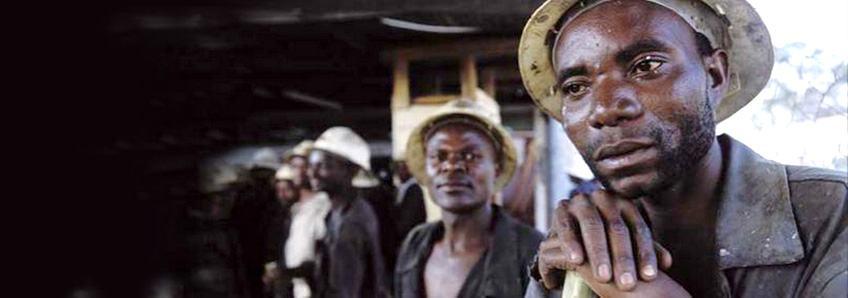
In a historic decision for South Africa, a Johannesburg judge ruled that thousands of gold miners can progress with their class-action lawsuit against 30 companies, which include African Rainbow Minerals, Anglo American, AngloGold Ashanti, Gold Fields and Harmony Gold.
Many of these workers claim they suffer from conditions such as silicosis and tuberculosis as a result of working within the approximately 80 mines that the lawsuit’s defendants own. The litigation could lead to a 10-year-long court case, the BBC reports.
As many as 200,000 miners are suffering from silicosis in what researchers have described as a “pandemic,” the result of working for years in these underground mines, CNN reported on Friday.
South Africa is one of the world’s largest gold producers, dating back to the 19th century when mineral riches in southern Africa turned hundreds of immigrants into millionaires. One of those millionaires was Cecil Rhodes, who established the famous Rhodes Scholarship program at Oxford University and for whom Rhodesia, now independent Zimbabwe, was named. But critics of the gold-mining industry have long pointed out its effects on the poorest workers, especially in South Africa, where illnesses such tuberculosis have ranked amongst the highest rates in the world.
According to South Carolina-based law firm MotleyRice, thousands of workers died from illnesses during and after working in South African gold mines. The plaintiffs’ litigation firm, one of the largest in the U.S., was retained by South African human rights attorney Richard Spoor to consult on the lawsuit, the origins of which date back to 2012.
Spoor claims that thousands of miners, many of whom were migrant laborers from some of the poorest regions in South Africa and surrounding countries, are still suffering from working in these mines, the operations of which date back as far as the mid 1960s. Spoor, who has worked on behalf of these coal miners’ cause since 2011, alleges that mining companies knowingly harmed their workers, even as they were aware of the dangers of silica dust, which researchers have long linked to silicosis.
Many environmental organizations, including Earthworks, have raised awareness for what they say are the dangers of the mining industry, and urged consumers to avoid what they describe as “dirty gold.” In addition to the health effects, Earthworks cites violence against indigenous peoples, land-grabbing, and other human rights violations due to the global gold-mining industry’s negligence or lack of oversight.
And as the world’s demand for gold surged, gold mining has become far more complicated. Publications such as Smithsonian Magazine outline how gold-mining is largely a carbon-intensive process, as massive amounts of earth must be processed to extract those lucrative trace amounts of gold. Whether processing gold from underground mines or open-pit installations, mining has left an indisputable impact on the planet and people.
To that end, South Gauteng High Court Judge Phineas Mojapelo ruled the lawsuit in South Africa can proceed for two groups of mine workers. Current and former miners who contracted silicosis, as well as descendants of deceased miners who worked for at least two years within one of the mines owned by the lawsuit’s defendants, comprise one class of plaintiffs. Mine workers who contracted tuberculosis, or the descendants of such miners, comprise another class under the litigation’s umbrella.
Spoor and his legal partners issued a statement shortly after the court’s announcement:
“A pervasive culture has existed for decades in the mining industry that views these miners as disposable. Therefore it has been a privilege to represent them and offer a voice to thousands who have never had one and who have been ignored by society. This class action is proof that when we push for what is right for those harmed, we can achieve real reform and in this case, overdue improvements to a broken system that has been in place for decades in the pursuit of justice.”
In a statement released to the media after Friday’s court decision, a spokesperson for the defendants said: “Either way, it should be noted that the finding does not represent a view on the merits of the cases brought by claimants.”
For many of these miners, some of whom have waited over a decade to see their day in court, justice has been slow. But Johannesburg certainly took a big step forward on Friday.
Image credit: Richard Spoor Inc. Attorneys

Leon Kaye has written for 3p since 2010 and become executive editor in 2018. His previous work includes writing for the Guardian as well as other online and print publications. In addition, he's worked in sales executive roles within technology and financial research companies, as well as for a public relations firm, for which he consulted with one of the globe’s leading sustainability initiatives. Currently living in Central California, he’s traveled to 70-plus countries and has lived and worked in South Korea, the United Arab Emirates and Uruguay.
Leon’s an alum of Fresno State, the University of Maryland, Baltimore County and the University of Southern California's Marshall Business School. He enjoys traveling abroad as well as exploring California’s Central Coast and the Sierra Nevadas.














